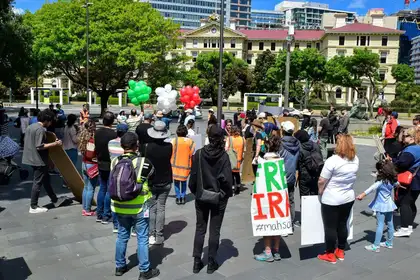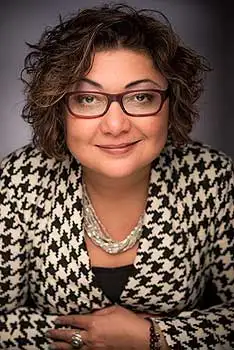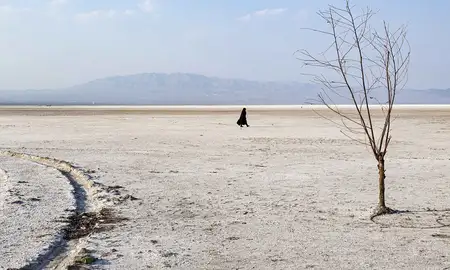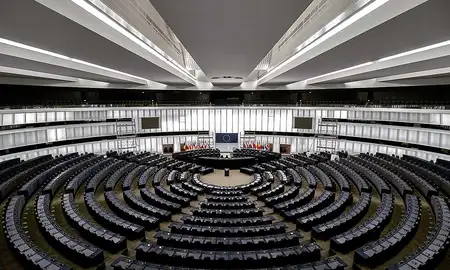
Free Iran protests in Wellington. Photo credit: Mr Roozbeh Karimi.
In a joint statement, Canada, Australia and New Zealand raised major concern over the deterioration of human rights in Iran and the violent treatment of women and girls by the Islamic Republic. They asked the international community to support the people of Iran and “grant access to the Special Rapporteur on human rights in Iran, to provide transparency and facilitate accountability on human rights concerns." They called for the termination of the Islamic Republic’s membership in the United Nations (UN) Commission on the Status of Women due to the regime’s gross violation of women rights.
The UN Security Council Arria formula meeting was co-hosted by the United States and Albania on 3 November, to draw attention to the ongoing violent attacks on peaceful protests, the oppression of women and girls, members of religious and ethnic minorities, and the rainbow community of Iran.
Javaid Rehman, Special Rapporteur on the Situation of Human Rights in the Islamic Republic of Iran, Shirin Ebadi, Iranian Human Rights Defender and Nobel Peace Prize Winner, and Nazanin Boniadi, Human Rights Activist spoke at the conference about the unlawful use of force against the peaceful protesters that began after the killing of Mahsa Jina Amini by security forces in Iran. All speakers considered the Islamic Republic as a regime that lacks any interest or capacity for reform.

Dr Negar Partow.
Back in September, when the protests against Mahsa’s killing began, the international community considered this mostly as a matter of internal politics, but when the extent of the regime’s violence was exposed to the world by Iranians inside and outside of Iran, the global opinion was shifted. As Nazanin Bonyadi stated in her speech at the meeting, Iranians tried to negotiate and reform strategies with the Islamic Republic for many years and are convinced that in this regime, reform is impossible. The Islamic Republic’s history of torture, execution, gender-based violence and oppression of ethnic and religious minorities attest to this resistance to reform.
The Islamic Republic’s breach of international norms is not exclusive to its violation of human rights, and extends to its involvement in the Russia-Ukraine conflict as well as supporting militias across the Middle East and threatening Iran’s neighbours. On 2 November, the United States raised concern over threats from Iran against Saudi Arabia, after the commander of Iran’s Islamic Revolutionary Guard Corps, Hossein Salami, warned Saudis for their support of the coverage of protests through a Farsi language Saudi-backed television channel in London.
From September to November, the nuclear negotiations were deemed unsuccessful, and dissatisfaction with the Islamic Republic’s support of Russia multiplied. The poverty rate in Iran peaked at over 10 percent and Iran’s currency lost significant value. As a result of the ongoing protest that has led to widespread strikes in Iran’s oil and industry sectors, Iran’s stock market lost all its value and collapsed in late October.
During this time, the cost of security for the Islamic Republic increased significantly. This is the direct result of the securitisation of politics, which is its dominant political trend. Since its inception, the Islamic Republic has pursued a one-party political system. Even this system, however, became the subject of securitisation. By 2005, the conservative faction of the regime expelled the reformists out of power and gradually tightened the circle of the elites.
Over the years, the securitisation of politics has made the regime rely exclusively on the Islamic Revolutionary Guard Corps (IRGC) and Basij, the security forces, both of which are under direct control of Khamenei. Since September, the regime has been using both forces to suppress the growing demonstrations and protests across Iran.
These operations, from intimating and beating people in the streets, to kidnapping protestors, monitoring hospitals and paramedics, arresting lawyers and doctors, patrolling streets and attacking schools, are costly.
The IRGC and Basij also became the dominant voice in the regime’s foreign affairs and under the leadership of Ghasim Soleimani made numerous operations outside Iran. Maintaining their connections cost more when the regime is under so much pressure and struggling to survive.
The United Nations Security Council (UNSC) meeting highlighted not only the violence that the Islamic Republic exercises inside Iran, but also the threats it poses to the region. As it has lost legitimacy inside Iran and its brutality has been exposed to the international community, the regime will look for an external conflict and their attempt spreads insecurity across the region. Whether their target is Saudi Arabia, or the Kurdistan of Iraq or Azerbaijan, by becoming a security threat, the Islamic Republic has become a threat to the international community that no longer could be ignored.
Gaining access to Iran for the UN envoy for Human Rights and conducting an international inquiry focused on the Islamic Republic’s violent operation of women and protestors will expose how systematic 'gender-apartheid' and security threats to the region have been sustained through corruption and criminal activity, and is funded by usurping Iran’s resources for expanding its oppression machine.
While it is very possible that in its final months the audacity of its corruption and deceiving strategies grow, after the UNSC meeting, every step that the regime takes is a move toward self-destruction. The termination of the Islamic Republic’s membership from the UN committee on the Situation of Women, is a global recognition of its gender-based violence and further isolates the regime in the international community.
Related news
Opinion: With an Iranian Feminist Revolution on the rise, the future of political Islamism is determined
Senior Lecturer Dr Negar Partow from Massey's Centre for Defence and Security Studies offers insights into the women's movement in Iran.

Opinion: International Women's Day and toxic masculinity in international security
We are celebrating International Women’s Day in 2022 in a time when the lack of women’s presence in international negotiations on peace and security is more evident than ever.
